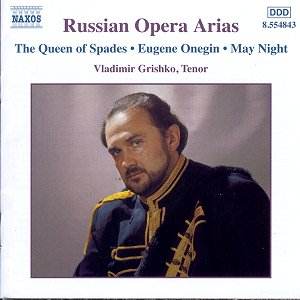The Ukrainian tenor Vladimir Grishko has earned himself
a place on the international opera stage in Europe and America since
winning prestigious awards thirteen years ago in the Ukraine and France.
This disc features him in standard and (at least to Western ears) relatively
unusual Russian operatic fare interspersed with orchestral contributions
to vary its contents, indeed these instrumental tracks take up half
the disc (and very well played they are too, particularly in the French
horn department) making the title ‘Russian Opera Arias’ only half the
story.
The reputation of Russian male voices tend to bask
in the glories of basses such as Chaliapin, and there have been and
are some fine baritones around too; as for tenors they don’t really
stand much chance in the natural order of things given the Italians.
Grishko’s voice is an acquired taste, baritonal, wide of vibrato, short
of steel, sometimes uncomfortably stretched above the stave. Hermann
in Tchaikovsky’s gloomy (when is he operatically never?) is a hugely
taxing role, a graveyard for tenors, and here he is far less comfortable
than in the extracts for Levko from Rimsky-Korsakov’s charming and richly
tuneful May Night, which threatens to break into Scheheherazade
at any point. Lensky (Eugene Onegin) is invested with lyrical
ardour in the two arias inspired by his unrequited love for Olga. Grits’ko’s
lovely recitativo style duet with the bassoon (pre-echoes of Stravinsky’s
Rite of Spring are striking), which dominate the start of his
song (another gloomy one of course) from Mussorgsky’s folksy Sorochintsy
Fair, also has a fine ending in which Grishko’s floating, falsetto
is beautifully controlled and coloured. The first Arensky work is purely
orchestral (the overture to the opera Dream on the Volga),
followed by the Song of the off-stage singer, not a career-propelling
rewarding role perhaps, but a charming aria which is mercifully at a
quicker tempo, if still in the minor mode.
If you are prepared for a lot of familiar orchestral
music from Eugene Onegin (Polonaise, Waltz etc) and the rest,
as well as the doom-and-gloom mood which dominates Grishko’s contributions,
it’s a disc worth the buy.
Christopher Fifield


